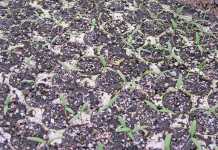Then we’ll be food secure for many decades to come,” my ouboet told me the other day while we were driving back from Bloemfontein. He’s a commercial maize farmer in the Free State, and I thought he was being a bit naïve at the time. Could things be so simple?
However, looking at recent manifestations of the ‘Mad Hatter Syndrome’, as I call it, at the Department of Agriculture, Forestry and Fisheries (DAFF), I wonder if he didn’t have a point.
First, director-general Langa Zita was expelled in June, followed by the chief director of communications Selby Bokaba in September. Now, to top it all, the minister has earache. That’s apparently why she missed an important parliamentary briefing for the second time in three weeks.
Actually, to be fair, it’s more than merely ‘earache’ – minister Tina Joemat-Pettersson has tinnitus, a condition that causes a ringing sound in the ears.
As if that’s not bad enough, the Iron Lady public protector Thuli Madonsela is overseeing three investigations against her. Ag shame, poor Tina! Mind you, never mind hearing a ringing in my ears, I’d be trembling from head to toe, if the formidable Thuli was on my spoor.
By the way, Selby was reportedly removed from his post for speaking to the media without permission. I just can’t see the logic in this. Is it not the job of the chief director of communications to speak to the media? Hoe meer dae, hoe meer dinge…
South Africa can’t afford this from the department that’s supposed to ensure sufficient and affordable food for the nation. Mark my words, the Marikana tragedy will look like a storm in a teacup if DAFF doesn’t create a policy framework conducive to the sustainable and profitable provision of food locally.
But how can it do that with a virtually dysfunctional top structure? Is it just me, or can the authorities simply not grasp the gravity of the matter?
It’s understandable that the SA government is concerned about the domino effect of the US drought on food prices. I’m increasingly hearing rumours about government price intervention, especially after the recent increase in the maize price.
Easier said than done, though – especially in a free market system, where local food producers have to compete on world markets with their highly subsidised global counterparts. And where they constantly have to fight against the dumping of cheap agri-products from other countries, for increased import tariffs to protect local industries.
The state has, in my opinion, a moral obligation to ensure a stable environment where farmers can produce food for all of us. Farmers do not deserve to be hurled about by the tempest of politics, crime, corruption and dysfunctional government departments.











